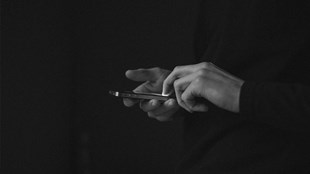You probably know the feeling – you’ve left your phone at home and you feel weird, anxious even, disconnected from the world. Do you have the symptoms of “nomophobia” (short for No Mobile Phobia), a new term for mobile phone addiction?
You can take a test to find out, in which you’ll be asked to rate how strongly you agree or disagree with various scenarios, such as “Running out of battery in my smartphone would scare me” and “I would feel weird because I would not know what to do”. You can find it here.
Nomophobia is often linked with Fear of Missing Out (commonly referred to as FOMO) – typically, compulsively using your phone to find out what everyone is doing, and getting anxious if they seem to be having more fun than you.
Of course, we wouldn’t be on our smartphones all the time if there weren’t so many pros; being constantly connected to friends, family, colleagues, cat videos, maps, weather forecast, by a device the size of a placemat.
But are you using your phone, or is your phone using you?
Our phone provides access to social media platforms, websites, and apps, many of which have been deliberately designed to keep you hooked. Most obviously, there’s the chance to “like” (and be “liked” in return), a common feature of most social media platforms such as Facebook. “Liking” is easy, it gives us the ability to send messages of encouragement, with minimal cognitive effort. And if you’re liked in return, it activates the reward pathways in the brain, and so we come back for more. (It also provides a valuable source of data that Facebook and Google can sell to advertisers.)
Notification technologies that compel us to regularly check our phones – “like” buttons and refresh functions – have been designed with compulsion as much as functionality in mind. They might give you the chance to connect, but this is increasingly shaped around the demands of an advertising economy chasing our attention, our loyalty, and our money. There has even been a backlash by some of the Silicon Valley techs who actually designed and engineered these everyday phone functions.
Teenagers, or “screenagers”, are particularly vulnerable, and so are women who are more likely to use their mobile phones for social purposes than men. There are other so-called phone-related pathologies such as “textaphrenia” and “ringxiety” (the false sensation of having received a text message or call that leads you to constantly check your device) and “textiety” (anxiety around receiving and responding immediately to text messages).
You’re unlikely to die from nomophobia and most studies looking at it have focused on adolescent and student populations, people of an age more prone to impulsivity and sensation-seeking behavior. According to a recent article in the Economist, millennials look at their phones on average more than 150 times a day. It’s not clear if nomophobia affects the population as a whole, and there’s no clear definition of what it actually is or a consistent framework for studying it, but it’s becoming apparent that problematic mobile phone use is an emerging problem to which many of us are vulnerable.
Also, that problem phone use is linked to anxiety and depression, and even that being separated from the phone in the short term can lead to physiological increases in heart rate and blood pressure. Some neuroscientists and psychiatrists suggest that being on the phone all the time over-stimulates the brain, disturbing sleep cycles and preventing the brain from going into what psychologists call the Default Mode Network, the creative state we enter when daydreaming or between waking and sleep.
And if mobile phones promote “connectedness” it seems to come at a cognitive cost. A study published this year by School of Business researchers at the University of Texas found that the mere presence of one’s smartphone can take up valuable cognitive resources, even when the phone was lying face-down on the desk. Participants who had “defined and protected periods of separation” from their phone (the phones were put in another room) and asked to do certain cognitive tasks, significantly outperformed those who put their phones on the desk. They also slightly outperformed those who had kept their phones in a pocket or bag.
While we might be consciously not thinking about our phone, the researchers suggested, the very process of consciously not thinking about something takes up some of our limited cognitive resources. As if most of us didn’t struggle to concentrate enough already! Your phone, the researchers suggested, is “a brain drain”.
Many psychiatrists say that only a percentage of people would be addicted to their mobile phones, but that many of us are overusing them. It’s hard to say at which point overuse become an addiction, but probably the point at which you know you shouldn’t be on the phone (because you’re driving, because you’ve got work to do, because you’re supposed to be sleeping, because you’re on the phone so much it’s affecting your primary relationship), and yet you can’t keep away from it.
Time to disconnect, then, or at least a bit? Some people are, using technologies to reduce or at least control the extent to which people interact with their devices. Some are replacing their smartphones with phones that don’t have the functionality of smartphones, or using apps that track, filter, and limit smartphone usage.
But it may be that we just need more acronyms. We have FOMO, but some have mooted JOMO, for the Joy of Missing Out ...








